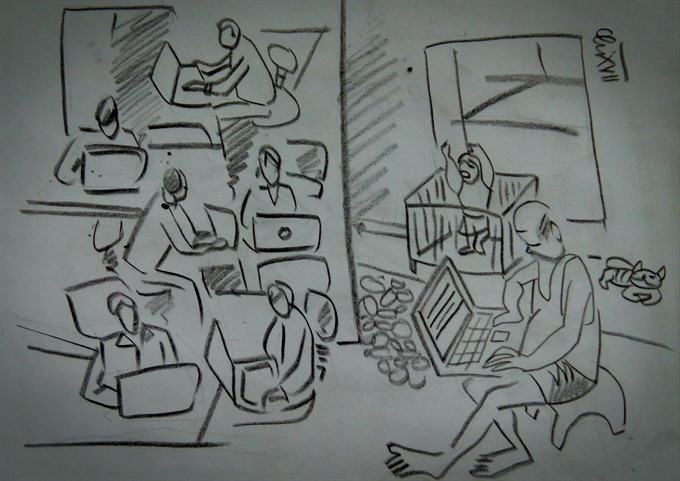 Talk Around Town
Talk Around Town

A proposal by a National Assembly deputy that some civil servants and other State cadres be allowed to work from home, saving office overheads, has generated a lively, timely debate.
 |
By Kiều Vân
A proposal by a National Assembly deputy that some civil servants and other State cadres be allowed to work from home, saving office overheads, has generated a lively, timely debate.
Timely because there is a lot of talk these days about the changes that the fourth industrial revolution will impose on us.
Ngô Duy Hiếu’s proposal is that the work-from-home option be tried out on a pilot basis first, with some of the civil servants visiting the office just one or two days a week, and doing the rest of their work from home.
His argument is that this would reduce costs (less travel, electricity and water consumption), reduce office space, and use of office equipment, save time, and increase efficiency because working from home would enable greater concentration.
Hiểu has clarified that his proposal would not apply to all agencies and positions, only certain selected ones like research institutions, universities, and those engaged in intellectual work like formulation of policies, programmes and plans, and some administrative work.
He also hinted, though not in as many words, that working from home instead of being cocooned in offices and officialdom would help officials connect with people and their real concerns.
Not far fetched
Given the digital advances that have taken place in the last few decades, and the connectivity afforded by the Internet and smart phones, this proposal is not far fetched.
Already, Party and Government leaders are holding online conferences where they can speak to local authorities and vice versa. This proposal can be seen as a logical extension of this.
Take my own profession - journalism. More and more people are getting their news online, and every news publication has an online version. Online shopping and payments are on the rise, too. If less people hit the roads for work and leisure, we can see it as a factor in reducing traffic congestion.
An editor, company accountant, an IT programmer, all these are jobs that can be done from home, to a whole or a large extent. Work can be co-ordinated, assigned by email and supervised online.
Lương Tố Quyên, a 36 year old accountant, has worked for four companies from home for the last three years. “Higher income, convenience and the ability to take timely initiatives are the advantages of working from home,” said the mother of three children.
The naysayers
Professor Nguyễn Minh Thuyết, former Vice Chairman of the National Assembly Committee on Culture, Education, Youth and Children, said there was no way civil servants could be allowed to work for home.
"A public agency directly communicates with people, directly serves and solves affairs of the people. If civil servants are at home, how will people come to know who to work with?" Thuyết asked.
His argument was echoed by Dr.Nguyễn Đức Thành, director of the Việt Nam Institute for Economic and Policy Research (Hà Nội University).
Civil servants are hired by the people who pay their wages through taxes. They have to serve the people whenever and wherever needed, he said, adding: "It is impossible to apply the model of business to a State administrative agency. The operational mechanisms, the need for effective supervision and the quality of work are entirely different."
Meanwhile, Dr. Vũ Hoàng Linh, lecturer and co-ordinator of the Public Policy Master Programme (Việt Nam-Japan University of Hà Nội University), felt the idea would be difficult to implement in practice and could even prove “counterproductive,” Linh said.
He explained: "A lot of administrative work requires interaction with people and businesses to support them in production and business. It is very difficult for civil servants to work at home; it can lead to many negative issues including corruption. "
Adding to this argument was Đinh Duy Hòa, former director of the Administrative Reform Department under the Ministry of Home Affairs.
“The bond with colleagues, especially direction of superiors is still very large and important," Hòa explained.
We’ll get there
Deputy Minister of Home Affairs Thang Văn Phúc was bit more receptive, saying the proposal should be studied further, but felt its application lay in the future when the IT infrastructure develops “synchronously,” the staff are well-trained, administration is modernised, e-government works well and smart cities are established.
It is said that in 2015, the United States had nearly half a million federal employees allowed to work remotely after former President Barack Obama signed the Employment Compensation Extension Act in July, 2010.
In June, 2014, the UK decided all workers had the right to apply for flexible working hours (including home-based work). In Sweden, civil servants of national and local administrations can work part-time or at home. Since October 2017, the Singapore government has encouraged flexible working-time policies, including working from home.
Việt Nam might not be there now, but it seems inevitable that we’ll get there, sooner rather than later. — VNS




